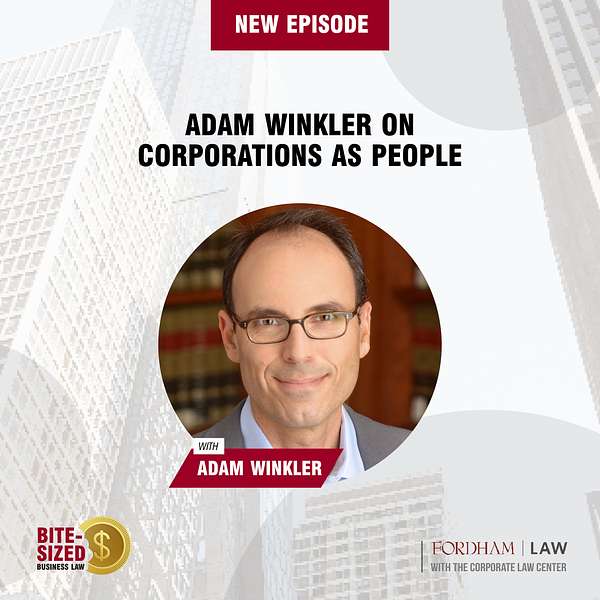
Bite-Sized Business Law
Looking for the latest in legal business news?
Get a breakdown of the top stories in business law from industry leaders on the front lines with Bite-Sized Business Law. Host Amy Martella takes a closer look at the latest corporate happenings through interviews with the attorneys, legal experts, public figures, and scholars behind the news to distill business law’s biggest stories into bite-sized portions.
This is your chance to go further into the world of business law and stay up to date with legal cases and industry trends.
Corporations impact us all, leading changes that extend far beyond business to shape the economy, public policy, technology, and beyond. Looking at the big picture, Amy discusses not only the underlying issues in business ethics and legal cases leading the biggest stories but also sparks thought-provoking discussions on where the law should be headed.
Amy is the Executive Director of the Corporate Law Center at Fordham University School of Law. Her background ranges from big law to government to tech startups, allowing her to offer an insider’s perspective of the issues that shape corporate actions, large and small. Covering crypto regulation to securities fraud, AI’s impact to Elon Musk’s pay package, Bite-Sized Business Law covers it all with guests of varying viewpoints to provide the nuanced analysis needed to tackle complex problems.
Whether you're looking for the latest in legal insight on intellectual property, mergers and acquisitions, business ethics or legal cases in the business law world, you’ll find it here. Enjoying a thoughtful perspective on the news stories of the moment, Bite-Sized Business Law examines big issues and delivers them in small doses.
Bite-Sized Business Law is a project by the Corporate Law Center at Fordham Law. The Center serves as a hub for scholars, professionals, policymakers, and students to engage in the study, discussion, and debate of current issues in corporate law. The Center focuses on aspects of corporate law, corporate compliance, antitrust law, and securities regulation. Through initiatives like the Mergers and Acquisitions seminar and the Securities Litigation and Arbitration Clinic, students actively engage in real-world research and cases, bridging the gap between classroom learning and practical application in the legal field.
Bite-Sized Business Law
Adam Winkler on Corporations as People
The recent Supreme Court decision on 303 Creative LLC v. Elenis left the nation debating whether the First Amendment grants business owners the constitutional right to turn away certain protected classes of individuals. It also raised other issues about corporate identity and personhood and made us ask: how did we get to the point where courts are treating corporate actors as indistinguishable from natural persons with individual rights? Here to help us unpack these issues is Adam Winkler, the Connell Professor of Law at the UCLA School of Law and a specialist in American constitutional law, the Supreme Court, and gun policy. He has published numerous books and articles, but for today’s discussion, we refer to his award-winning book, We the Corporations: How American Businesses Won Their Civil Rights. Tuning in, you'll learn about the corporate rights movement and the landmark cases that laid the foundation for corporate personhood in America. We also discuss which rights corporations should (and should not) have, the influence corporations have on the electoral process, and how AI might shape our understanding of corporate personhood going forward, plus so much more!
Key Points From This Episode:
• Insight into the “corporate rights movement” and the purpose of corporate personhood.
• When companies became people: the history of corporate personhood in America.
• The 200-year quiet revolution led by business corporations to gain constitutional rights.
• Why the Supreme Court has historically sided with businesses.
• The foundations laid for corporate law by Bank of the United States v. Deveaux.
• Citizens United: a landmark decision regarding the political speech rights of corporations.
• Who really speaks when a corporation speaks.
• The influence corporations exert on the electoral process, even without the right to vote.
• Hobby Lobby and freedom of religion.
• Why granting corporations rights based on shareholder’s rights and interests is “slippery.”
• The 303 Creative decision and its intersection between the First Amendment and anti-discrimination laws.
• The problem with distinguishing between closely held corporations and public corporations.
• Property versus liberty: which rights corporations should and should not have.
• How AI might change the way we think about corporate personhood.
Links Mentioned in Today’s Episode: